- Home
- Nevil Shute
Stephen Morris and Pilotage Page 2
Stephen Morris and Pilotage Read online
Page 2
‘I see,’ said Morris. ‘Do you get much special charter work?’
The other glanced at him shrewdly. ‘No,’ he said. ‘Between you and me, we don’t. It’s been a great disappointment that - a great disappointment to both of us. We’ve only had one real charter since Easter; a man called Simpson whose wife started dying in Manchester one Sunday morning - I got him there in about three hours. But that’s the only one,’ he added impressively, ‘- the only one since Easter.’
‘I suppose you depend on that rather in the winter. Try and work it up when joy-riding’s slack?’
‘Try hard enough,’ said Stenning grimly, ‘the people just don’t come. Cut our prices for long distances to rock bottom - too low I say. The people don’t come and we don’t make any profit to speak of on the ones that do … ’
He spat a little fragment of tobacco from his lip. ‘It’s been a great disappointment, that side of it,’ he repeated. ‘Riley says it needs more advertising and boom than we can afford. I don’t know about that - he does all that side of it. All I know is that we don’t get the business. Of course, the joy-riding pays all right in the warm weather.’
He entered on a string of admonitions, mostly concerned with the upkeep of the machines and the method of picking up passengers with the least expenditure of time and petrol. Morris listened respectfully; the little man knew his business from end to end. Riley had chosen his partner well; a plain little man who knew his own limitations and who would work like a horse at the practical running of the business.
He was a great talker; he rambled on from one subject to another. Morris had been to the hut? They had thought it out when they started up in this business, and Riley had said it would be best if at first they lived like on Service, or more so. It cut the overhead charges. It suited them well enough. It had been a bit of luck getting this place. It had been quite empty when they came; they fixed up to rent it from the farmer on whose ground it stood, who could get nothing out of the Air Ministry for it. It had been put on his land during the war and just left there. They paid a very low rent. The farmer grazed cattle on the aerodrome; one had to watch them when taking off or landing. Riley said they had no legal tenure here at all. Six weeks after they had come, a caretaker had arrived and reported that they were there. There had been a little fuss about it at first, but the Air Ministry had not gone to the length of evicting them. Riley said that so long as they paid rent to the farmer and the Air Ministry didn’t, they were all right - unless the Air Ministry took away the buildings. He (Stenning) didn’t know much about the Law. He thought the Air Ministry didn’t want to bust up a company that was doing good work. Anyway, they had been there just over a year now, and nothing had happened.
Then a low hum from the north announced the other machine. Riley came in low over their heads and waved a hand as he passed, went to the south of the aerodrome, turned into the wind, and put the machine down just outside the hangars. He, too, taxied into the hangar, assisted by Stenning and the mechanic.
They closed the great sliding doors and walked back to the hut. Presently a hot meal made its appearance.
‘Didn’t do so badly today,’ said Riley. ‘You’ve got those Air Ministry licences, have you? The ones I wrote to you about.’
‘I got those,’ said Morris. ‘When do I start work? I’d like half an hour or so on the machine before going out - I never did more than five hours or so on the Avros, and that was years ago.’
‘You’ve seen your machine?’ asked Riley. ‘Oh well, you’d better stay at home tomorrow. Have an hour or so in the air, brushing up short landings, particularly. It’s easy enough work. Then if anyone comes up and wants a flight, you can take them up. They’re always doing that, and it’s awkward when we’re all away.’ He paused. ‘Did you use the car?’
‘Yes,’ said Morris. ‘That gear’s nothing serious. The gate’s shifted a bit - it’s all loose.’
‘Is that all?’ said Riley. He yawned sleepily. ‘It only happened yesterday - I must see about it some time. Or if you’re at home tomorrow you might see if you can do anything, will you? If you find anything bust, get Peters - the chap in the hangar - and put him on to it. He’s all right, but he wants watching on any job he hasn’t done before. Let’s have supper.’
After supper he cleared the table and produced a small typewriter from a case and a bundle of letters. He set up the machine on the table and proceeded to answer the letters in rapid succession. Stenning settled down with a pipe and a novel.
‘Can I help at all with those?’ asked Morris.
‘Don’t think so, thanks,’ said Riley. ‘They don’t take long.’ He read another. ‘Stenning.’
Stenning looked up.
‘Town Council of Lymington got an annual fair and horse show on the fifteenth. That’s the place I went to alone last year and turned away more than I could take up - you remember. They offer us a field and two policemen.’
‘Wish other towns ’d do that.’
‘How many machines shall we send?’
‘Let’s send two, and t’other chap stay at home; then if we want him we can telephone for him, or he can go to Seaview or somewhere for the afternoon. And I say, why not put out a placard like we do for Bournemouth?’
‘What’s that?’ asked Morris.
‘Offer the seats in the machines going and coming back at rather reduced rates,’ said Riley. ‘We often manage to make the cost of sending the machine there and a bit over.’ He picked up the letter and read it again. ‘I think that’s best,’ he said, and began to type rapidly.
He looked up again presently. ‘Air Ministry want to know why we haven’t reported those centre section modifications yet. All the machines have got ’em, haven’t they? The front spar fittings, they were - three laminations instead of two to the wiring plate.’
‘Mine has,’ said Stenning.
There seemed to be nothing for Morris to do; he got up and went to the door of the hut. It was quite dark, and a fine, starry night. It was attractive outside; he put his head back inside the hut.
‘Be back in half an hour or so,’ he said, and vanished into the darkness.
Stenning took his pipe from his mouth.
‘Where’s he going?’ he inquired, surprised.
‘Dunno. He’s a queer bird.’
‘Well, that’s a funny thing, going off like that. It’s all dark out there. Anyone would think he had a date.’
Riley smiled. ‘He’s all right - he’s like that. I remember him in the Squadron. What d’you think of him?’
‘He’s all right,’ said Stenning, ‘if he can fly. I like him; we might have done a lot worse.’
‘Oh, he can fly all right,’ said Riley, and bent to his work.
Outside it was cool and fine. A fresh night breeze was blowing down Channel, bringing a tang of salt water with it. It had gone round a bit, Morris thought, and was now easterly, which should be a good sign for this part of the world. He glanced up and tried to see the ‘stocking’ but it was hidden in the darkness.
He strolled along aimlessly and happily through the derelict air station, along the broad dark roads past towering deserted buildings. Presently he came out on the aerodrome by their own hangar. In there were the machines, his machine. He was back again, back in his own trade, the only thing he could do well.
He paced the roads, speculating, as he walked, upon the future. Aviation was going to be a big thing. It was in a bad way now, and might sink even lower. But one day aviation would be a big business again, a bigger affair than the sideshow at a local fair and horse show. Already the air lines were in being, already there were rumours of commercial aeroplanes in the true sense; machines properly designed for the business, with proper cabins and lavatories, just as in a train or any other transport concern. Surely this aviation would be a great thing, would take the place in the world to which it was entitled, and that before so very long.
And he was in it, back in it again, back in this business that he knew.
Presently it would develop; he would be there to do his bit in the development of this new industry. More air lines would spring up, more manufacturing companies; he was in it now, in it at the start, when things were bad. There would be big fortunes to be made by men who pinned their faith to it now; one day he might be a rich man. Money meant such a lot - one could do nothing without money. This work that he loved might bring him back in time to that other love that he had lost.
Morris was up early next morning; the sunlight, streaming in on to his bed, coupled with the novelty of his surroundings, made sleep difficult. He got up and went to the door of the hut and stood in the sun, looking out over the Solent towards the twin chequered forts of Spithead and the mist over Portsmouth. It was a brilliant summer morning, with a sort of crisp freshness in the air that was never felt at Oxford. He shivered a little, turned back into the hut, and set to work to start up the Primus to boil some water for a wash.
‘There’s a bath outside,’ said Riley sleepily from his bed, ‘a bath-house with a shower. Second building as you go along.’ He relapsed again into a comatose condition.
Morris went and looked at it, disliked it, braced himself, and returned with a glow of conscious pride. Breakfast appeared in due course, and the mechanic and two boy clerks arrived on bicycles. After the meal they walked down to the hangar and set about the business of the day.
There was little to be done. Riley and Stenning both seemed to accept entire responsibility for their own machines, and Morris found himself attending in a similar manner to his own. He fussed about it for a little, replaced the plugs in the bottom cylinders and filled the tanks. Then Stenning and Peters came to help him get the machine out into the open.
He ran a final eye over the machine, put on his helmet, and clambered into the pilot’s seat. He busied himself for a little, head down in the cockpit, getting quite comfortable, feeling the run of the levers, adjusting them for starting the engine. He strapped the safety belt around him, and was struck by an old feeling, the feeling that the machine was a part of himself. It would be intensified when he got in the air. He only had it on relatively small machines - one never had that sympathy with a Handley Page.
Then he looked up. ‘Right,’ he said to the mechanic.
‘Switch off, sir.’
‘Switch is off.’
It was familiar, that formula. The mechanic stepped to the propeller and turned the engine by it over nine compressions. Then he looked at Morris.
‘Contact, sir.’
Morris moved his hand a little. ‘Contact.’
The mechanic threw his weight on to the propeller and swung clear. The engine gave a half-hearted spit and was silent.
‘Switch off, sir.’
‘Switch is off.’
The man pulled her over once or twice more. Then he swung her again; she fired with a spit and a rumble, sending a queer, familiar quiver through the structure. Morris let her run for a little, then signalled the man round to the tail. Riley joined him and they held the tail down in a gale of wind as Morris ran the engine up to its full speed.
Satisfied, he shut her down again, settled himself comfortably in his seat, wriggled his shoulders a little, and took the stick in one hand. He nodded to Riley and waved to the mechanic, who pulled the chocks from under the wheels and ran clear. Morris gave her a little burst of power and moved out on to the aerodrome.
As he taxied over to the far side, he was quite clear what he would do. He would take her off gently, let her fly herself off the ground, in fact, and take her up to about fifteen hundred in a slow climb. Perhaps a little higher. He didn’t want to go stalling and spinning into Mother Earth just because he’d forgotten how to fly. No, he would take her up carefully to a safe height and then play about on her. When he felt comfortable, he would come in and land her at a safe speed. After that he would try one or two slow landings.
He reached the middle of the aerodrome, turned, and faced her up into the wind. He had a long, clear run for it.
Instinctively he gave a look round at the sky above, as though for other machines. Then he took a light hold on the stick and opened her out. The machine accelerated cleanly and went scudding over the aerodrome.
Almost immediately he pressed the stick forward, got her tail up, and held her balanced on the wheels in flying position as she gathered speed. He stole a quick glance at the air speed indicator - about forty-five. Well, she could have it any time now. Then he knew that if she was to stay on the ground any longer, he would have to hold her there; he eased the stick back a little, delicately, with the pressure of three fingers. The hard vibration of the earth had ceased, and now the grass dropped away beneath the planes. He was clear, and in a moment the hangars were at his side and below him.
The clean rush of air past him was intoxicating.
He let her run on her course, still climbing, till he was over the Solent at about five hundred feet. ‘Round we go,’ he said, turned her, and headed back to the aerodrome. It struck him, as he climbed higher still, that he had not thought about doing that turn; he had done it naturally, as instinctively as a turn upon a bicycle. He smiled a little.
He passed over the aerodrome at about a thousand feet. Peering forward round the windscreen along the curved nose of the machine he could see the Channel before him on the far side of the Island, blue and corrugated with waves. Then he looked back along the fuselage to the tail and waggled his rudder a little to see it move. He was struck by an old feeling; that he was afloat in a solid medium; that if he were to contrive to fall out of the machine, he would float, like a bottle dropped from a fast motor-boat. It was inconceivable that one could fall.
Then he turned back over the aerodrome again, throttled his engine and put her on the glide, gently pulling her up to stalling point. He pulled her up until the warning came; the sloppiness in the lateral control that meant she was very near a stall. He held her in that critical position for a time, noting the air-speed reading, the feel of the controls, and the position in which he had to sit. Then he let her down into the normal cruising position, switched on his engine, and pulled her level. He would know that stalling feeling again when he met it.
He had thought when he went up that he would find himself out of practice, ‘ham-handed’. That was not so; he flew round for a little time essaying various tricks, vertical banks and Immelman turns; his hands seemed as light as ever they had been. Finally he was ready to land.
He brought her down in a wide spiral glide a mile from the aerodrome, faced into the wind at about three hundred feet, eked out the glide with a little engine, came in low over the hedge rather faster than he had meant to, and skimmed the grass. He was going too fast, but there was heaps of room. He held her off till the speed dropped, sailing along a foot above the grass.
Then he put her down, bounced once, and came to a standstill.
He took her off again from where he was and went up to about two hundred feet to try again. This time he brought her in slowly, so slowly that Stenning bit his lip as he watched. But no disaster ensued; the machine dropped slowly over the hedge, touched ground in a very short distance, and pulled up quickly.
A third trial produced a well-judged sideslip landing in a corner of the field. Stenning turned to Riley.
‘He’s not bad, that fellow,’ he said. Riley smiled.
Morris flew over to the hangars a foot above the ground, and finished up close beside them. He faced her up into the light wind, stopped the engine and leaped to the ground.
‘Like her?’ asked Riley.
‘Very nice,’ said Morris. ‘The stick seems a bit short. I don’t know. The undercarriage doesn’t sound happy when you land. Thought it was coming off the first time.’
‘So did I,’ said Stenning dourly. Riley laughed.
They poked about the undercarriage for a little and cured the trouble with a dab of grease. Then they stood for a little time chatting in the sun.
‘Well,’ said Stenning, ‘this won’t buy baby a n
ew frock.’ He called to Peters and the clerks, and they started hauling his machine from the hangar.
‘Better take her up as much as you like today,’ said Riley, ‘till you think you’re quite all right on her - landing in small fields particularly. Only remember she costs money, and it all comes out of our screw at the end of the week. I’m going to Portsmouth today and tomorrow, and Stenning to Newport again. After that, Stenning’ll have to lay up for a top overhaul, I think - though she isn’t running so badly considering. You’d better come over to Portsmouth some time today and have a look at the field we fly from, so as you can find it again. You can’t miss it - I shall be flying from there - it’s about half a mile north-east of two factory chimneys close together on the east of the town. And by the way, there are three of the placards for Lymington in the hut, with the names of the Ryde hotels who’ll show them for us on the backs. You might take those along if you’ve got time. And tell the manager of the Esplanade - no, I’ll do that myself.’
‘Right you are,’ said Morris. ‘And if anyone comes along here I take them up?’
‘Oh, yes,’ said Riley. ‘Wait a bit, I’ll give you one or two cards.’ He fumbled in a breast pocket and produced a couple of printed cards of charges. ‘There are more of these on the shelf where the typewriter is in the hut. Don’t let them beat you down - they sometimes try it on.’

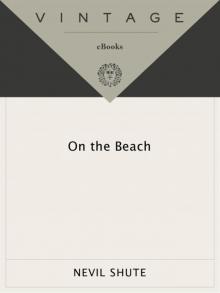 On the Beach
On the Beach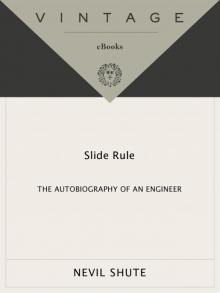 Slide Rule
Slide Rule A Town Like Alice
A Town Like Alice The Far Country
The Far Country Pied Piper
Pied Piper Round the Bend
Round the Bend An Old Captivity
An Old Captivity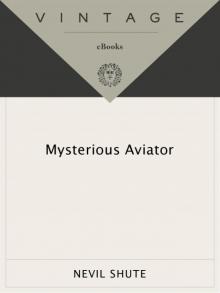 Mysterious Aviator
Mysterious Aviator The Breaking Wave
The Breaking Wave Marazan
Marazan Lonely Road
Lonely Road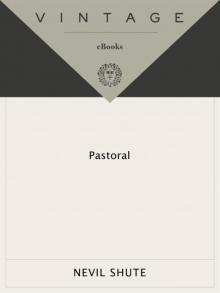 Pastoral
Pastoral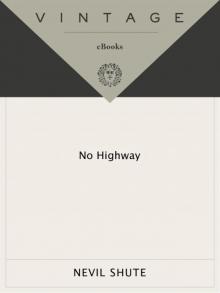 No Highway
No Highway Stephen Morris and Pilotage
Stephen Morris and Pilotage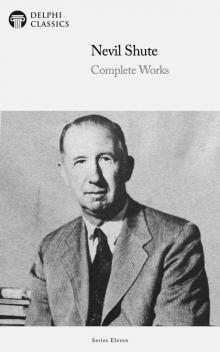 Complete Works of Nevil Shute
Complete Works of Nevil Shute Most Secret
Most Secret Beyond the Black Stump
Beyond the Black Stump The Rainbow and the Rose
The Rainbow and the Rose The Chequer Board
The Chequer Board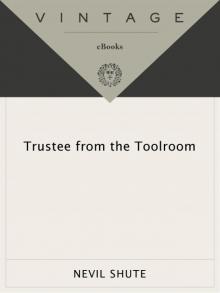 Trustee From the Toolroom
Trustee From the Toolroom Ordeal
Ordeal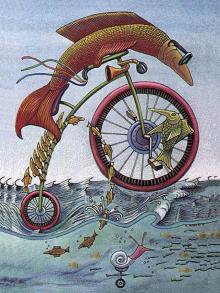 Stephen Morris
Stephen Morris